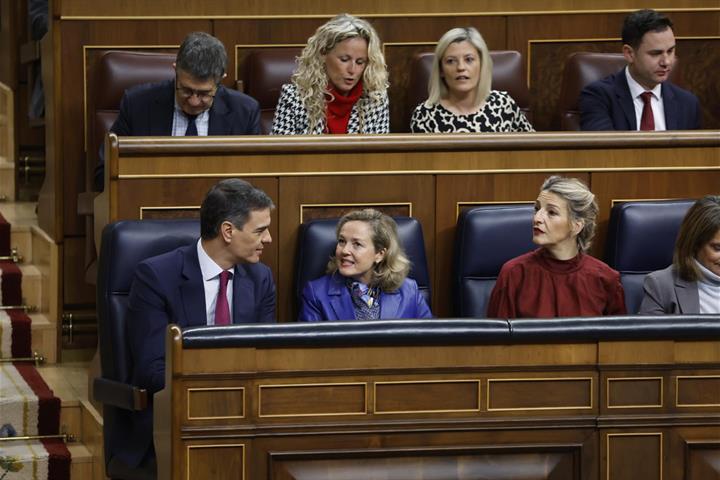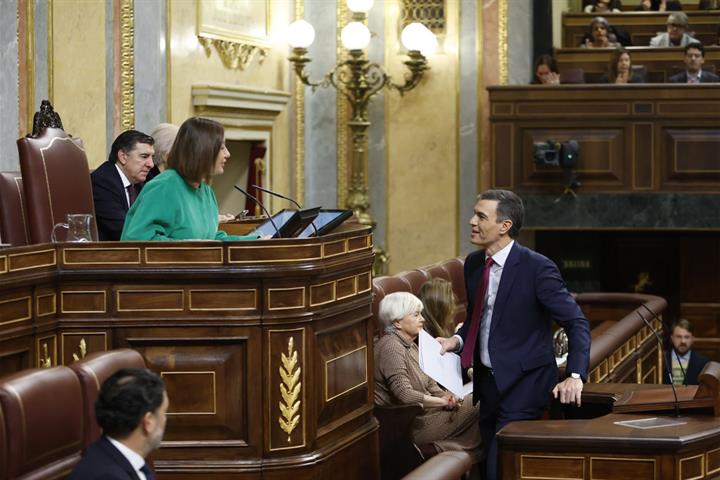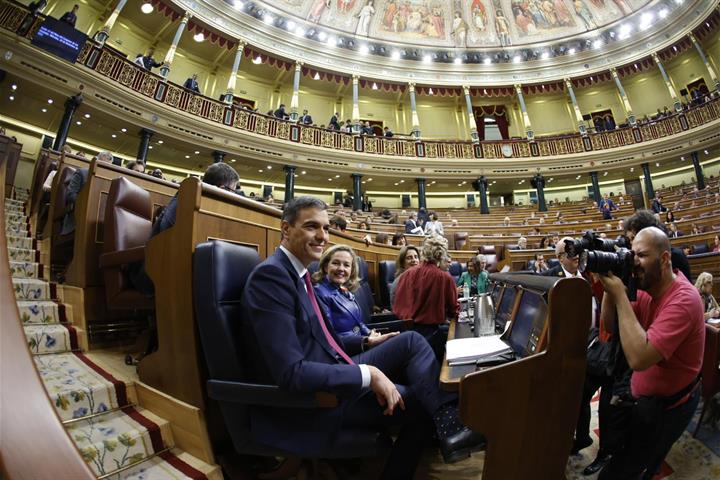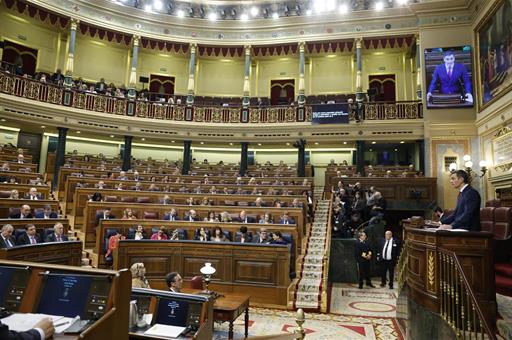Pedro Sánchez says Spain has led the enlargement of the European Union
President's News - 2023.12.20
Lower House of Parliament, Madrid
At his own request, the head of the Executive appeared in the Lower House of Parliament to take stock of the presidency of the Council of the European Union and to report on the conclusions of the European Councils of June, October and December.
During his speech, Pedro Sánchez recalled that the European Council agreed to begin negotiations for the accession of Ukraine and Moldova to the European Union, a commitment that he conveyed to the Ukrainian President, Volodymyr Zelenskyy, during his visit to Kyiv on 1 July, the day on which Spain took over the rotating presidency.
In the president's opinion, new states joining will not only expand the EU, but "will help us bring more security, more jobs, more prosperity to the territories of our country" and to every corner of the EU. "This is one of the great legacies of the presidency", which has been "a real success", he said, because historic agreements have been reached and more than 50 legislative dossiers have been closed, a figure higher than the average for previous European presidencies.
Furthermore, Sánchez stressed that all autonomous communities have taken part in the presidency, in a unique and pioneering exercise of decentralisation in the European Union as a whole.
The president highlighted Spain's leadership in developing the priorities set at the beginning of the presidency: reindustrialisation of Europe, green transition, social and economic justice, and strengthening unity.
Reindustrialisation of Europe
 The President of the Government of Spain, Pedro Sánchez, the First Vice-President and Minister for Minister for Economy, Trade and Companies, Nadia Calviño, and the Second Vice-President and Minister for Work and Social Economy, Yolanda Díaz | Pool Congreso
The President of the Government of Spain, Pedro Sánchez, the First Vice-President and Minister for Minister for Economy, Trade and Companies, Nadia Calviño, and the Second Vice-President and Minister for Work and Social Economy, Yolanda Díaz | Pool Congreso
Spain's position on this issue is clear, the president said: "The days of massive industrial relocations to other continents or blind dependence on imports must end and we must strengthen our domestic production capacities.
Pedro Sánchez has maintained that Spain has to guarantee its competitiveness in those sectors in which it is a leading country, such as tourism, agri-food and vehicles, and promote new industries that create quality jobs and generate wealth: "We have to do it with more innovation, more training, more industrial policy and further development and integration of the single market.
In the European Councils, Spain has defended its commitment to strengthening open strategic autonomy, but without falling into protectionism or anti-globalisation, and, at the same time, its interest in expanding links with the outside world, guaranteeing environmental and social sustainability and the consolidation of democracy in third countries: "Openness creates more jobs than it takes away. And it helps to increase the income of Spaniards by generating more economic activity. This vision of the future, the president added, was endorsed by the EU-27 at the informal summit in Granada.
The head of the Executive reviewed the reforms approved in the industrial field, including the regulation of the first law on Artificial Intelligence. The Government of Spain has played a leading role in its development because it was the first in the world to approve a digital rights charter, which served as inspiration for the text, and two pioneering agencies related to this.
Pedro Sánchez also stated that progress was made in the modernisation and protection of traditional sectors, such as the agri-food sector, and a very important agreement was reached on fisheries.
The president also indicated that during the Spanish presidency, the EU's foreign agenda has been promoted with the holding of the Summit between the European Union, Latin America and the Caribbean. Trade agreements have also been reached with Chile, New Zealand and the African, Caribbean and Pacific group of states. These commitments, he said, will allow "diversification of supply chains, opening up new markets and opportunities for Spanish companies".
Green and environmental transition
The second priority of the presidency, Sánchez said, was to move towards a green transition and environmental adaptation to the climate emergency because future generations "deserve to inherit a healthy planet".
This challenge, the president has maintained, holds great opportunities to create new industries and jobs in our country. It means drastically reducing dependence on energy and raw materials imported from abroad and, therefore, "substantially lowering the electricity bills of our homes and businesses" and making our industries more competitive.
To achieve these goals, agreements have been reached during the presidency to reduce polluting gases from industry and air transport, to reuse waste and recycle products, and the Nature Restoration Act has been passed. Likewise, Sánchez stressed, Spain represented Europe at COP28, a summit at which "a historic agreement was reached that marks the beginning of the end of the dominance of fossil fuels on the planet".
Pedro Sánchez also highlighted that this year, for the first time in Spain's history, "the generation of energy from renewable sources will exceed 50% of the total volume, i.e., more than the sum total of fossil fuels and nuclear energy". "Spain and Europe must therefore take on and lead the race towards sustainability. And this leadership will also make us more prosperous, healthier and more competitive in the economy that is already under construction", he concluded.
Social and economic justice
 Pedro Sánchez, at the beginning of his appearance before the Plenary Session of the Lower House of Parliament to take stock of the Spanish Presidency of the EU and report on the latest meetings of the European Council | Pool Congreso
Pedro Sánchez, at the beginning of his appearance before the Plenary Session of the Lower House of Parliament to take stock of the Spanish Presidency of the EU and report on the latest meetings of the European Council | Pool Congreso
The head of the Executive conveyed that "one of the obsessions of this progressive coalition government has been and continues to be to demonstrate that it is not necessary to choose between improving companies and improving the dignity of workers".
In this sense, he argued that Spain in the last five years has demonstrated that in a complex context, job creation and wage increases can be made compatible: "In the last legislature, we managed to increase the wages of one in four workers and we passed a groundbreaking labour reform that has given back rights and bargaining power to millions of people, be they employers or workers and their trade union representatives. And, at the same time, he added, "we boosted business creation and managed to create two million jobs, thus reaching the best figure in history".
Sánchez pointed out that Spain promoted this vision for the EU as a whole, as was made clear at the Tripartite Social Summit held in Brussels in October, which approved measures to strengthen consumer rights and improve the working conditions of millions of workers.
From the social perspective, the president cited agreements to implement a European disability card, to combat violence against women and human trafficking, and to extend the rights of other vulnerable groups.
Pedro Sánchez also described the reform of the electricity market as historic, which has made it possible to "reduce the volatility of electricity prices, increase the transparency of electricity bills, protect consumers from the abuses of some energy multinationals, open the door to public intervention in the markets when an energy crisis is declared, and to continue to promote renewable energies".
This reform, which has the Iberian solution negotiated by Spain as a precedent, has allowed Spanish households to save more than 5.1 billion euros, reduce electricity bills by 27% last year and consolidate a fall in the retail price of electricity of 30% between the last half of 2022 and the first half of 2023. "We are the country in Europe where the price has been reduced the most," Sánchez stressed.
Strengthening Europe's unity
The fourth priority of the Spanish presidency was to strengthen the unity of Europe, the president said, "because we have enemies both within and outside our borders". "These enemies can be seen with Putin, they set one national flag against another, they have done everything they can to divide us by using international misfortunes to their advantage and, fortunately, they have not succeeded. On the contrary, they have made us as a whole more cohesive and stronger", he added.
Pedro Sánchez has emphasised that for the European Union to prosper it must be more united, more integrated internally and more coordinated in all foreign policy matters. And in this presidency, he said, decisive steps have been taken in this area.
Commitment to the values and aspirations of the European Union
The head of the Executive recalled that in 11 days' time it will be 37 years since Spain joined the European Communities, which means that integration into Europe is part of institutional normality for many citizens. This everyday naturalness, he added, is "a great triumph of Spanish democracy", but it also obliges us to "educate" the younger generations about what "this great democratic project of freedoms and rights" represents.
Pedro Sánchez stressed that the data "endorses the success of that commitment": in these almost four decades, the real Gross Domestic Product has more than doubled, exports of goods and services have multiplied by six, the female employment rate has increased from 26% to 61%, and Spain has developed the second most extensive high-speed network in the world.
"Our pro-European yearning is based on historical evidence, but also on shared values", said Sánchez, who maintained that this conviction allows Spain to be a driving force in the European project. "That is why our voice is listened to, respected as never before, our proposals form consensus," he said. The president stressed the Executive's commitment "to the values and aspirations of the European Union" and to the "mandate shared by the vast majority of Spanish society, based on a resounding certainty: that Europe is the best thing that has ever happened to Spain".
Israel and Palestine: living together in peace and security
 The President of the Government of Spain, Pedro Sánchez, together with the First Vice-President and Minister for Minister for Economy, Trade and Companies, Nadia Calviño, moments before his appearance | Pool Congreso
The President of the Government of Spain, Pedro Sánchez, together with the First Vice-President and Minister for Minister for Economy, Trade and Companies, Nadia Calviño, moments before his appearance | Pool Congreso
The situation in Israel and Palestine was the focus of part of the president's appearance. Sánchez reiterated the condemnation of the "repugnant murders perpetrated by Hamas terrorists", the demand for the immediate and unconditional release of all hostages, the defence of the fight against terrorism throughout the Middle East and the recognition of the right of any country to defend itself and to exist.
"With the same conviction and the same values, we must demand a halt to the killing of civilians in Gaza," said Sánchez, who called for an end to the bombing and the arrival of humanitarian aid urgently and in a sufficient quantity.
"Europe must demand compliance with international law, and particularly with international humanitarian law", he added. The president called for Europe to speak "with clarity and unity" and to contribute actively to the search for a definitive and comprehensive solution to the conflict, including the recognition of a Palestinian state living side by side in peace and security with the Israeli state. "At some point in the legislature, we will have to address the recognition of the Palestinian state by the Parliament and the Government of Spain," he said.
Legislature of agreements, reforms and social progress
The president of the Government of Spain recalled that, a month before Spain took over the rotating presidency of the EU he called a general election "to clarify the political situation". Now that Spain has a new Executive, "the country needs four years - as I proposed in my investiture - of political stability, economic growth and social justice. In short, it demands, it requires agreements, reforms and social progress", he indicated.
In a Lower House where "nobody has a sufficient majority to impose their positions", "we will continue to use dialogue as our tool and agreement our goal", said Sánchez. The president has advocated the search for consensus with the economic and social agents, the autonomous communities and local entities, the nationalist and pro-independence parties and the opposition, which he has encouraged to participate in a "useful policy that solves problems".
The head of the Executive specifically proposed "three agreements of constitutional development and of vital importance for citizens" to the PP: the renewal of the General Council of the Judiciary, after "five years of blockage"; the reform of Article 49 of the Constitution to dignify the treatment of people with disabilities, and the reform of the regional funding system.
Thanks to Nadia Calviño
In his speech, the head of the Executive described it as an "honour" and a "privilege" that the First Vice-President, Nadia Calviño, has been elected as President of the European Investment Bank. "You have brought rigour, brilliance and audacity to the economic policy of this Executive, and for this we will be eternally grateful to you", he said.
The election of Calviño, the first woman to hold this post, is "a confirmation that Spain is at the heart and head of the European Union" and also "demonstrates the feminist commitment of Spanish society as a whole and of the Government", he said.
Non official translation





